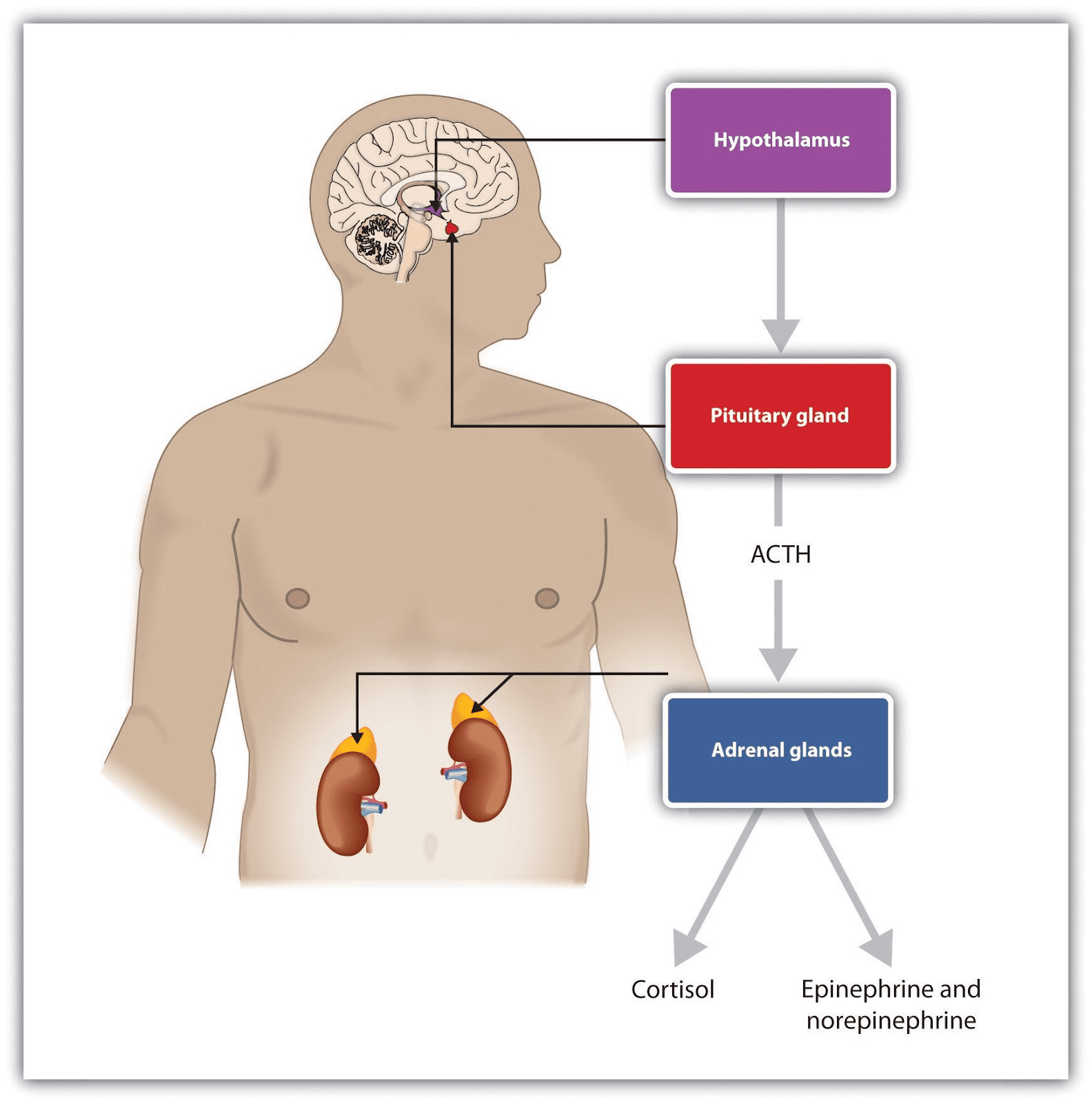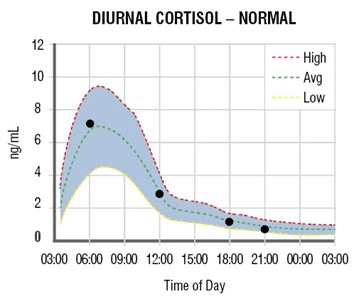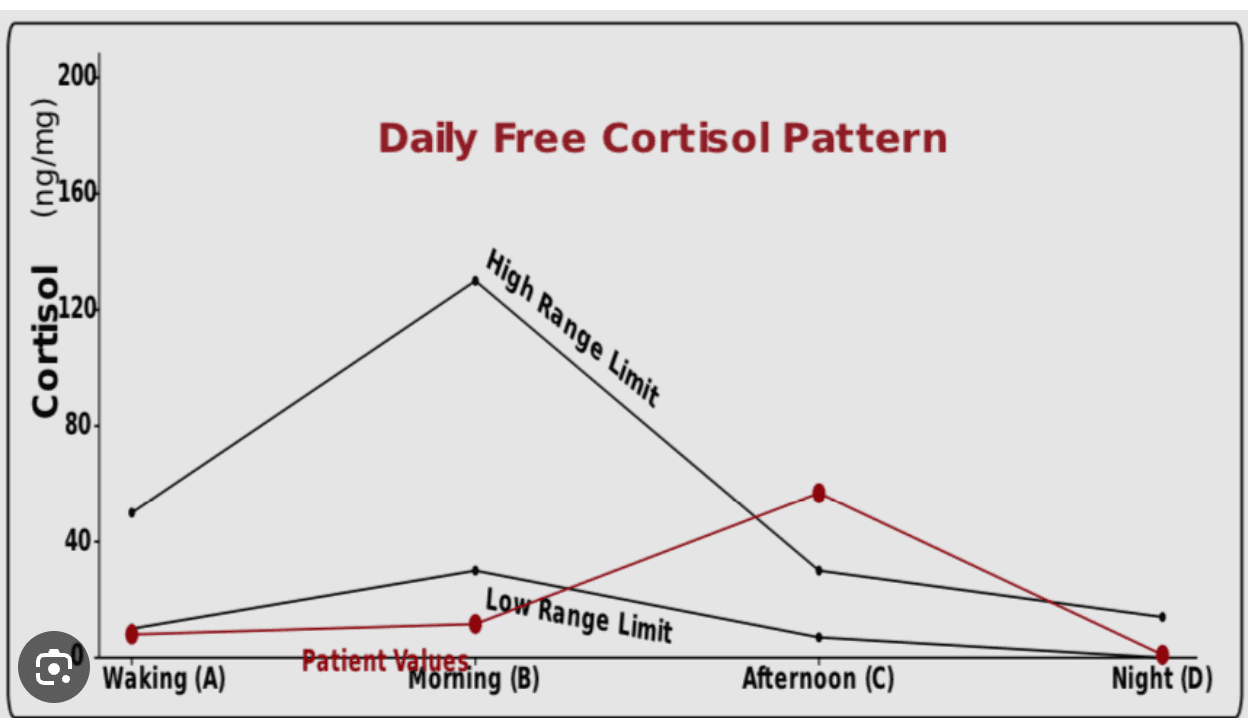Tired, Overweight, Depressed...Has Your Cortisol Gone Rogue?
Tired, Overweight, Depressed...Has Your Cortisol Gone Rogue?
by Sheri Opsahl Guy, Health Coach

Cortisol - The Master Hormone
Do you have trouble falling asleep and staying asleep? Have you put on extra pounds that you can't seem to get rid of? Do you suffer from anxiety or depression? If so, you could be experiencing adrenal dysfunction caused by excessive cortisol production.
Cortisol is known as the "master hormone" because of its essential role in regulating a wide range of bodily functions. It regulates our blood glucose levels, manages our body's inflammation, and controls our sleep-wake cycle (Cortisol and Stress: The Master Hormone by Charles Stone. Page one of the introduction). The proper amounts released at the right times of day optimize our body's processes.
In this article we are going to address the external and internal causes of stress. We are also going to explain the mechanism behind cortisol production, the symptoms of cortisol dysregulation, and provide suggestions on how to regulate your cortisol levels naturally so that you can maximize your energy and your overall feeling of well-being.
Our brain perceives stress both externally and internally. Chances are you have experienced at least one extremely stressful event in your life or know someone who has. You may have gone through a painful divorce, been laid off from a job, or lost a loved one. These types of "external" stressful experiences produce high amounts of cortisol. It is important to understand, as well, that our daily habits and health can actually be "internal" stressors and contribute to excess cortisol production. Some of these possible internal contributors include:
Disease & medical conditions like: autoimmune, type 2 diabetes, high blood pressure
- Insufficient water intake
- Eating high carb foods, on a regular basis, that spike your insulin
- Processed foods and drinks
- Excessive caffeine
- Sugar and artificial sweeteners
- Going without food for long periods of time
- Vitamin and mineral deficiencies
- Lack of sleep
Too much high intensity exercise
Stress causes a cascading release of hormones throughout the body. Verywell Health: What is the Hypothalmic-Pituitary-Adrenal (HPA) Axis? To oversimplify a complex process that takes place in the body, it all starts with what the brain perceives is stress and unleashes a chain of events. The hypothalamus of the brain perceives stress and sends signals to the pituitary gland to produce the adrenocorticotropic hormone (ACTH). ACTH then communicates with the adrenal glands, two small cone shaped glands that sit on top of each kidney, and tells them that they need to jump into action. The adrenals then produce the quick acting hormones of adrenaline and noradrenaline (also known as epinephrine and norepinephrine). Adrenaline and noradrenaline are your "fight or flight" hormones and kick in when your body perceives immediate danger. An example of this is when you jerk your car out of the way to avoid an accident. These quick acting hormones are designed to activate for very short periods of time. If the perceived stress or danger is still present after a short period of time, less than 10 minutes, cortisol is released and persists for the remainder of the time the body is under or perceiving stress.

A diurnal cortisol curve is used for assessing adrenal hormone function. Saliva samples are taken upon waking, before lunch, before dinner and before bed and cortisol levels are measured at each interval. You can then chart them on a 24-hour graph and determine your cortisol production cycle. Below is a diagram of the natural diurnal curve. The green line depicts a healthy cortisol curve based on the time of day. It spikes high when we wake up to help us get out of bed and start the day. By bedtime, it has drastically declined to very low levels to help us fall asleep.

Chronic stress is much more common in our world today and often contributes to dysregulation of cortisol. After long periods of stress our body can become unable to produce cortisol at the appropriate time. This is called adrenal dysfunction.
Have you experienced the phenomenon of being "wired and tired”? This is when you're exhausted or overly tired but too anxious to sleep or if you're tired all day and get your second wind right before bedtime. These symptoms are often referred to as adrenal fatigue. However, the more accurate term is adrenal dysfunction.
The red curve in the graph below shows someone who is suffering from adrenal dysfunction.

The body’s processes start to break down when someone is experiencing adrenal dysfunction. NIH - Library of Medicine - Stress: Endocrine Physiology and Pathophysiology When cortisol levels cannot be produced at the amount the body is demanding, it may "steal" hormones from other areas of the body. In women, it will take hormones such as progesterone and convert it into cortisol. BodyLogicMD - Learn how to increase Progesterone for women This leads to low levels of progesterone which can then create sleepless nights, amplified levels of anxiety, menstruation problems, infertility and more. For men, testosterone is "stolen" to make cortisol when high levels are demanded. Symptoms of adrenal dysfunction include:
- Weight gain (especially in the belly)
- Loss of muscle & bone
- Challenges with sleep, such as falling asleep, staying asleep, and waking up in the morning
- Infertility
- Low libido
- Mood swings, anxiety, depression
- Imbalances in other important hormones, such as DHEA, Estrogen, Progesterone, Testosterone
- Disruption of digestion
Adrenal dysfunction can also contribute to Type 2 Diabetes. Poynor Health - Early Adrenal Fatigue & Weight and Metabolic Syndrome Diabetes: How Stress Contributes To Insulin Resistance And Diabetes Verywell Health: What is the Hypothalmic-Pituitary-Adrenal (HPA) Axis?
Stress signals the adrenals to create cortisol, which tells the body to release stored blood glucose into the bloodstream. Chronic high blood glucose leads to insulin resistance, which is a precursor to Type 2 Diabetes. Isn't it interesting that the standard American diet isn't the only contributor to a diabetes diagnosis?
- Reduce your stress - Deep breathing has a physiological effect on the body. Deep breathing pushes more oxygen into our bloodstream which helps lower cortisol. When you feel stressed, take in a slow, deep breath, hold, then slowly release. Repeat for 5 minutes.
- Get to the root of your illnesses - Have you been diagnosed with a disease or condition? Work with a holistic practitioner who can help you resolve it instead of masking it with pharmaceutical products.
- Create healthy sleep habits that strengthen your circadian rhythm - Get 7-9 hours of quality sleep. Go to bed and get up at the same time everyday. Fall asleep no later than 10:30pm or 11:00pm.
- Drink adequate water -- Get in a minimum of 100 oz of water per day - If the body isn’t getting enough water, it will go into survival mode, releasing cortisol.
- Regulate blood glucose - Do not starve yourself. Many of us need to eat small meals throughout the day. Regulate your insulin (high and low blood sugar) by not skipping meals and avoiding refined carbohydrates that cause your blood glucose to spike.
- Choose whole foods - Stick to foods in their natural state and avoid processed foods, including nut and seed oils.
- Micronutrients - ‘Eat the rainbow’ of vegetables and some fruits to make sure you get in all of your vitamins and minerals.
- Work out - If you are already chronically stressed, adding high intensity interval training (HIIT) can put your adrenal glands right over the edge. Back off intense 90% heart rate exercises and opt for more weight training and medium impact cardio like speed walking.
The human body is complicated. Working on balancing our King Hormone - Cortisol, we can help support our health journeys. If implementing these habits doesn't improve your symptoms, seek out a holistic practitioner who can run further tests and help create a program to support and optimize your health.
About the author:
Sheri Opsahl Guy, owner of the functional medicine health coaching company, AtoZ FITT, has helped thousands of clients improve their health over the past 15 years. She has assisted her clients, through food and lifestyle changes, to support their bodies and rid them of the symptoms of autoimmune diseases, metabolic conditions such as Type 2 Diabetes, and imbalanced hormones, and helped them with permanent weight loss.
Cited Work:
NIH - National Library of Medicine - Neuroanatomy, Hypothalmus
NIH - Library of Medicine - Stress: Endocrine Physiology and Pathophysiology
BodyLogicMD - Learn how to increase Progesterone for women
Poynor Health - Early Adrenal Fatigue & Weight and Metabolic Syndrome
Diabetes: How Stress Contributes To Insulin Resistance And Diabetes
Verywell Health: What is the Hypothalmaic-Pituitary-Adrenal (HPA) Axis?
Dr. Deb Matthew - Functional Medicine Specialist
Practical Approaches To Stress Management
The Hormone Prescription with Dr. Kyrin Dunston Podcast #40: Balancing Your Mood & Hormones with Functional Medicine with Dr. Deborah Matthew
THIS WEBSITE IS NOT INTENDED FOR PROVIDING MEDICAL ADVICE
